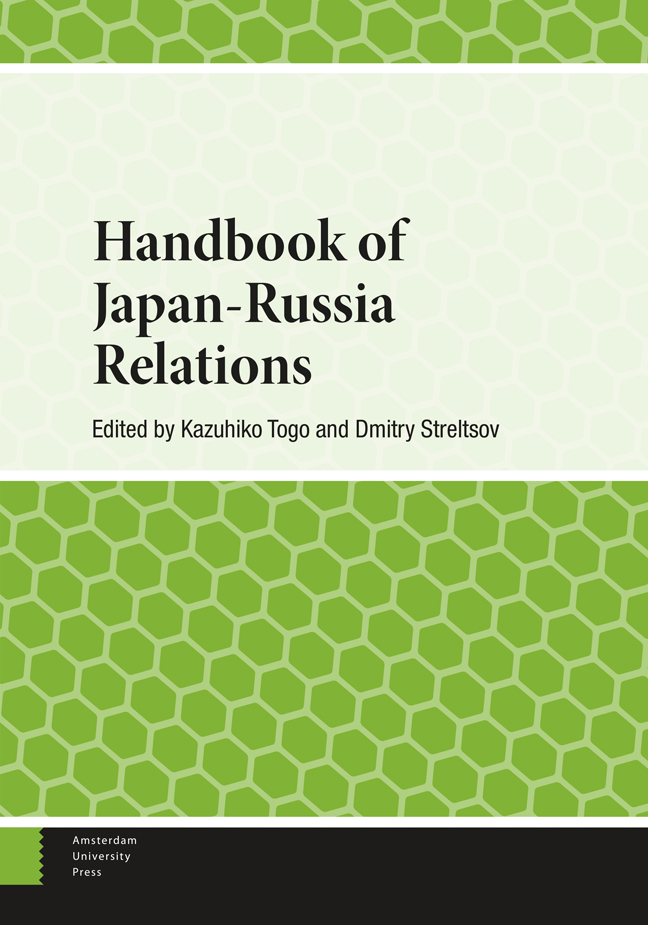Book contents
- Frontmatter
- Contents
- Dedication
- Acknowledgements
- Contributors
- Abbreviations
- Introduction
- Part 1 War and Peace: Diplomatic Relations and Security
- Part 2 Territory
- Part 3 The Economy and Energy
- Part 4 Disaster Cooperation
- Part 5 Culture
- Part 6 Perceptions of the Other
- Appendix 1 1956 Joint Declaration
- Appendix 2 Tokyo Declaration (1993)
- Appendix 3 Moscow Declaration (1998)
- Appendix 4 Irkutsk Statement (2001)
- Appendix 5 Foreign Ministry Statement (2022)
- Index
5 - The Territorial Dispute: The Russian Perspective
Published online by Cambridge University Press: 26 March 2024
- Frontmatter
- Contents
- Dedication
- Acknowledgements
- Contributors
- Abbreviations
- Introduction
- Part 1 War and Peace: Diplomatic Relations and Security
- Part 2 Territory
- Part 3 The Economy and Energy
- Part 4 Disaster Cooperation
- Part 5 Culture
- Part 6 Perceptions of the Other
- Appendix 1 1956 Joint Declaration
- Appendix 2 Tokyo Declaration (1993)
- Appendix 3 Moscow Declaration (1998)
- Appendix 4 Irkutsk Statement (2001)
- Appendix 5 Foreign Ministry Statement (2022)
- Index
Summary
This chapter addresses the unsolved problem of border demarcation, widely known as the Russo-Japanese territorial dispute, which is the most sensitive and complicated issue in bilateral relations. The author dwells upon the origins and the main landmarks in the postwar development of this dispute, focusing not only on the principled differences in the positions of the sides per se, but also on the international and domestic political context of their formation which can explain the motivations of both Russia and Japan. The author concludes that the issue of the borderline has been raised in the context of a peace treaty between the two countries, which have diametrically different status in the outcome of World War II.
Introduction
One of the most serious problems of the historical past, which occupies a central place in Russo-Japanese relations, is the unsolved problem of border demarcation, widely known as the Russo-Japanese territorial dispute. It involves four Southern Kurile Islands (Iturup, Kunashir, Shikotan and Habomais), with approximately 3,000 sq km of territory and about 200,000 sq km of waters around them, abundant with fish and other marine resources. The lack of a mutually recognized borderline is rooted in the absence of a peace treaty between the two countries after World War II.
The Japanese side believes that the territorial dispute with Russia arose as a result of unilateral and illegal actions of the Soviet Union at the end of World War II when it occupied the ancestral Japanese territories. Since 1956 the four islands have been declared as Japan’s “Northern Territories.” This name continues to be used in official documents of the Japanese government at present. Russia denies the territorial problem per se and rejects Japan’s claims as untenable and not based on legal and historical facts. Moscow recognizes only the existence of the unresolved problem of border demarcation, but insists that it should be settled only after the conclusion of a peace treaty that would reflect common understanding of the results of World War II by both sides.
Historical context
It should be noted that both Russia and Japan have their own historical arguments for the legality of their sovereignty over the islands. It is also evident that the Kuril Islands cannot be called ancestral territories for either side, while the dispute around the issue of which side was the first to include them in its domain is absolutely fruitless.
- Type
- Chapter
- Information
- Handbook of Japan-Russia Relations , pp. 75 - 94Publisher: Amsterdam University PressPrint publication year: 2024

